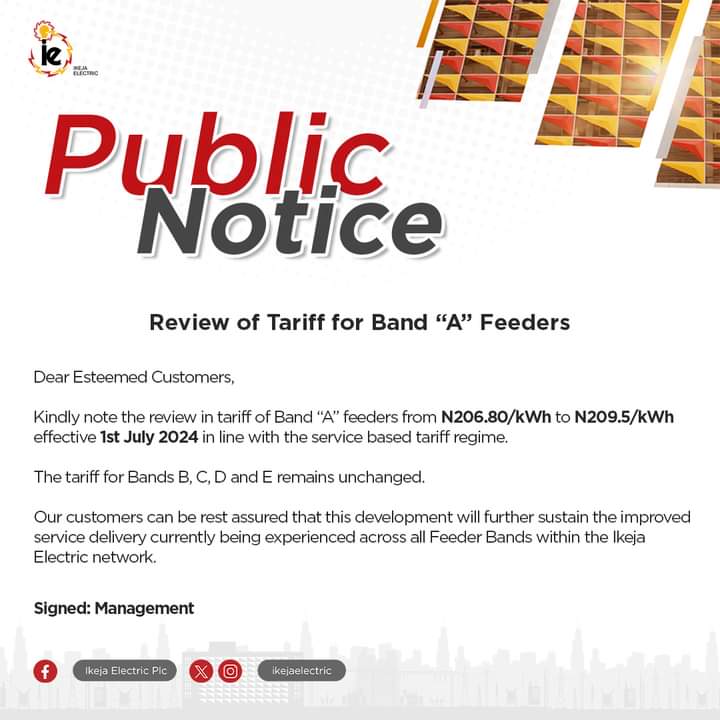Some electricity distribution companies (DisCos) have announced an increase of electricity tariffs for its Band A customers on Wednesday. This announcement is coming amidst the concerns by the Nigerian Labour Congress against segregation of electricity tariffs and its increment.
The tariff has been increased from N206.80/Kilowatts(kWh) to N209.5/kWh.
This upward review takes effect from July 1, as seen by official statements issued by some of the distribution companies.
As seen on its X account, the Port Harcourt Electricity Distribution Plc (PHED) said:
“Dear esteemed customers, Please be informed that there is an upward tariff review for our Band A feeders from N206.80/kWh to N209.5/kwh effective 1st July 2024. The guaranteed availability of a minimum of 20 hrs per day still stands.
“The tariff for Bands B, C, D, and E remains unchanged.”
Likewise, Kaduna Electricity Distribution Company (Kaduna Electric) said:

“Dear esteemed customers, the management of Kaduna Electric informs the public of an upward review in the tariff of Band A feeders from N206.80/kWh to N209.5/kWh.
“The review is effective from 1st July 2024 and affects prepaid and postpaid customers. Kaduna Electric assures customers on its Band A feeders of the continued availability of 20-24 hrs daily as stipulated in the service-based tariff regime”.
In a statement signed by Acting managing director IBEDC, Francis Agoha, he says the NERC has ordered the immediate upward review of the tariff. He said:
“Effective immediately, the tariff will be adjusted from N206.80/kWh to N209.50/kWh. This review has been duly approved by the Nigerian Electricity Regulatory Commission (NERC) as captured in the mIn April, the Nigerian Electricity Regulatory Commission (NERC) ordered the immediate upward review of electricity tariffs. multi-year tariff supplementary order.”
Similar posts were made by Ikeja Electricity (IE) and Abuja DisCo (AEDC).

In April 2024, the NERC announced a huge increase in electricity tariffs for customers under the Band A category to ₦225 per kWh, a 240% increase from the initial ₦68 per kWh (kWh).
The NERC Vice Chairman, Musiliu Oseni, said only 15% of the electricity consumers are affected by the hike.
Findings have shown that gas pricing, foreign exchange rate variables, and inflationary pressure are key factors considered by electricity sector stakeholders before upward tariff review. Most industrial areas, highbrow estates, and residences are classified under Band A.
An Electricity Market Specialist for Power Generation Companies (GenCos), Adetunji Adeyeye, had earlier said in the year that the Nigerian Electricity Regulatory Commission (NERC) will reduce the electricity tariff for Band A customers based on economic factors. In an interview with Arise tv, he said:
“If dollar keeps coming down, inflation keeps coming down, electricity tariff will be coming down as well, whereas it gives also the discos the needed cash to continue to improve and provide efficiency.”
This was with the promise that band A would enjoy 20 to 24 hours of electricity per day. However, the electricity tariff continues to increase for the Band A users.
